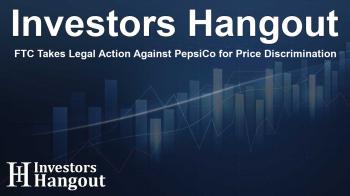FTC Takes Legal Action Against PepsiCo for Price Discrimination

FTC Takes Legal Action Against PepsiCo
The U.S. Federal Trade Commission (FTC) has recently taken a significant step by filing a lawsuit against PepsiCo Inc. (NASDAQ: PEP). This legal action represents an application of the seldom-utilized Robinson-Patman Act, a law established in the 1930s aimed at curbing price discrimination against retailers.
Understanding the Robinson-Patman Act
The Robinson-Patman Act was designed to protect small businesses from unfair pricing practices. By ensuring that suppliers offer the same prices to all retailers, this law intends to foster a fair market landscape where smaller retailers have equal opportunities as larger competitors. As a result, violations of this act can lead to significant ramifications for companies found to discriminate in pricing.
The Nature of the Lawsuit
As details of the lawsuit remain limited, the client of the FTC has not disclosed the specific allegations against PepsiCo. However, given the nature of the Robinson-Patman Act, it is likely that the complaint pertains to situations where PepsiCo may have offered preferential pricing to certain retailers over others.
Implications for PepsiCo and the Market
This lawsuit could have broader implications not only for PepsiCo but also for the industry at large. If the FTC succeeds in its case, it may deter similar practices across the beverage industry, prompting companies to reassess their pricing strategies.
Potential Consequences for Price Discrimination
The violations of the Robinson-Patman Act can lead to repercussions, including fines and mandated changes to business practices. Companies found guilty of price discrimination may also need to pay damages to affected retailers, creating a financial incentive to comply with fair pricing regulations.
PepsiCo's Commitment to Fair Practices
As a leading brand, PepsiCo's commitment to fair pricing is crucial in maintaining its reputation among retailers and consumers alike. The company has historically positioned itself as a supporter of equitable business practices, and this lawsuit could test that commitment.
Frequently Asked Questions
What does the FTC lawsuit against PepsiCo involve?
The lawsuit involves allegations of price discrimination against retailers, citing the Robinson-Patman Act.
What is the Robinson-Patman Act?
The Robinson-Patman Act is a law aimed at preventing price discrimination and ensuring fair pricing practices among suppliers and retailers.
What could happen if PepsiCo is found guilty?
If found guilty, PepsiCo may face fines and may be required to change its pricing practices, potentially compensating affected retailers.
How does this lawsuit affect other companies?
This case could set a precedent and encourage scrutiny of pricing strategies among other major beverage companies, promoting fair competition.
What is the significance of this lawsuit?
This lawsuit underscores the FTC's commitment to enforcing laws that protect retailers and ensure fair competition in the marketplace.
About Investors Hangout
Investors Hangout is a leading online stock forum for financial discussion and learning, offering a wide range of free tools and resources. It draws in traders of all levels, who exchange market knowledge, investigate trading tactics, and keep an eye on industry developments in real time. Featuring financial articles, stock message boards, quotes, charts, company profiles, and live news updates. Through cooperative learning and a wealth of informational resources, it helps users from novices creating their first portfolios to experts honing their techniques. Join Investors Hangout today: https://investorshangout.com/
Disclaimer: The content of this article is solely for general informational purposes only; it does not represent legal, financial, or investment advice. Investors Hangout does not offer financial advice; the author is not a licensed financial advisor. Consult a qualified advisor before making any financial or investment decisions based on this article. The author's interpretation of publicly available data presented here; as a result, they should not be taken as advice to purchase, sell, or hold any securities mentioned or any other investments. If any of the material offered here is inaccurate, please contact us for corrections.
